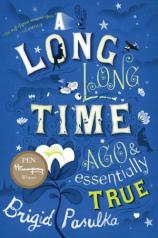Reading Group Guide
Discussion Questions
A Long, Long Time Ago and Essentially True

1. Early in the novel, Beata introduces herself as Baba Yaga, the name she goes by for most of the book. We don’t learn her given name until her grandfather returns to Poland and greets her with it. Why do you think the author made this choice? What effect, if any, did it have on your reading experience to know the narrator only by a nickname?
2. On page 3, the narrator says, “We Poles have always been known by our golden hands.” Do you think Beata carries on her grandfather’s legacy? Why do you think Beata is ultimately the narrator of both stories, that of her grandparents and her own?
3. Beata describes the TV retrospectives and commercials that she and Irena watch as symbolic of the New Poland --- caught between the past and the future, communism and capitalism. Where else in the novel does Pasulka illustrate Poland’s “in-betweenness.”
4. Many of the older Polish citizens in the novel are unsure just how grateful they are to be rid of the communists, if it means becoming capitalists. What do you think Irena means on page 53 when she says, “Capitalists are just communists without the polyester”?
5. Irena, Magda, and Beata form a constantly shifting triangle of alliances. What binds these women together, and, ultimately, what does Beata fear will tear them apart? Discuss the various incarnations of family that appear throughout the novel ¬¬--- what binds any of these people together? Do you think extraordinary circumstances cause people to behave in ways they never would otherwise, or do such circumstances merely expose the true colors of people’s hearts?
6. Beata sees herself as the “responsible” daughter, compared with Magda, who constantly gives her mother aggravation. How do you think this perception influences Beata’s behavior in Kraków and the way she relates to her aunt and cousin?
7. How do you feel about the betrayal Beata thinks she has committed against Magda? How do her feelings of betrayal affect her throughout the novel?
8. After filming Pani Bozena, the grande dame of Kraków retreats into depression and emerges as a simpler, kinder woman, which Beata thinks must be her true self. What really triggers this transformation for Bozena? Discuss other transformations that occur in the novel, and compare the mechanics of each.
9. “Act as if.” This motto is repeated throughout the novel. What meaning does this phrase have for the people of Half-Village? For the communist Poland of Irena’s youth? What does it mean for Beata and her generation?
10. On page 244, Beata describes her feelings of hopelessness, despite the elation she should expect to feel after having roundly berated Ronan and his English friends. Do you think her pessimism is justified?
11. Why do you think Beata is so lost in her own life, existing but without direction or even a clear desire? What events finally come together to set her on her own path?
12. Beata tells Irena that Nela told her stories with only happy endings. Do you think A Long, Long Time Ago and Essentially True has a happy ending? How do you feel about the ending?
A Long, Long Time Ago and Essentially True
- Publication Date: May 18, 2010
- Genres: Fiction, Historical Fiction, Literary Fiction
- Paperback: 368 pages
- Publisher: Mariner Books
- ISBN-10: 0547336284
- ISBN-13: 9780547336282








